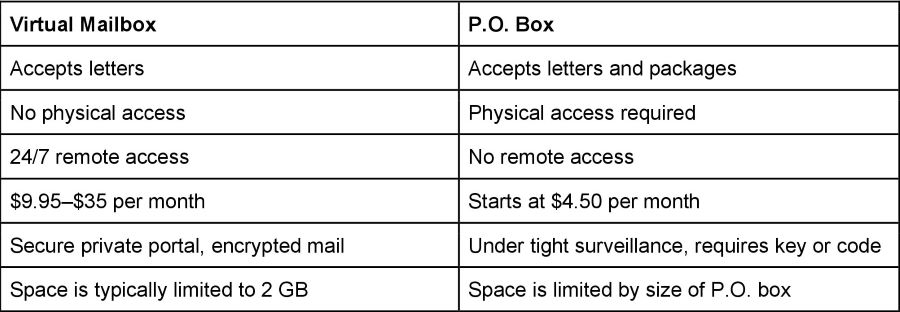Featured image by mikeledray
Traditionally, a PO box has been the go-to alternative for business owners who don’t want to use their home address, but a virtual mailbox is a newer option.
As the owner of a small business, you need an address to register your business. But if you don’t have a physical store or office, you may be left in a pickle. Do you expose your private home address, or is there a better option?
Both options offer privacy and convenience for entrepreneurs, but there are several key differences you’ll want to consider before making the best choice for your business.

What Is a Virtual Mailbox?
A virtual mailbox is a service that receives, scans, encrypts, and uploads your mail to a secure, private portal. You instantly receive your mail as a digital PDF, and then your mail is stored indefinitely in the cloud for you to access whenever you’d like. Many services will even remove your junk mail so you only receive relevant correspondence.
While this type of service provides you with a physical address, which is necessary for business functions, you cannot visit your mailbox in person. Therefore, you can’t receive packages. However, many virtual mailbox services offer package forwarding. This allows you to maintain the anonymity of your personal address.
Key Benefits of a Virtual Mailbox for Business Owners
There are several key perks of having a virtual mailbox:
24/7 Remote Access
Rather than taking time out of your day to travel to a PO box, you can quickly check your mail from anywhere you have access to a computer or phone. Your mail is always accessible, so you can pull up a document whenever and wherever you need it, eliminating the need for a paper filing system.
File Sharing
Virtual addresses are great for entrepreneurs who want to share important mail documents with other business partners or employees. They allow you to integrate with services like Dropbox or Google Drive for direct file sharing.
Privacy and Security
With a virtual address, you don’t need to associate your home address with your business, even if you run your business out of your home. A virtual address offers privacy and, thanks to its many layers of data encryption, superior security.
Business Mobility
If you consider yourself a digital nomad, or if your business’s physical location is constantly changing, it’s a hassle to constantly update your new address. To do so, you need to notify your client base or other business partners and update your official business records with the state. With a virtual address, your business operations can stay mobile with a consistent mailing address.
RELATED ARTICLE: DUTY OF CARE: YOUR LEGAL RESPONSIBILITIES AS A BUSINESS OWNER
What Is a PO Box?
A post office box, or PO box, is a designated mailbox located at a post office near you. They are typically numbered and only accessible with a key or lock combination. You pick up your mail from your PO box rather than having a postal carrier deliver it to your home or business. You can choose different sizes from extra small to extra-large and rental lengths in increments of three, six, or twelve months.
Key Benefits of PO Boxes for Business Owners
There are several perks of having a PO box:
Affordability
PO boxes start at just $4.50 per month for the smallest size and go up to $22.50 for the largest size. Given that virtual mailboxes can range from $9.95–$35 per month, PO boxes are generally a more budget-friendly option.
Package Reception
Package reception is a key benefit you don’t get with virtual mailboxes. According to the USPS, the largest box option (XL) measures 12” by 22.5” and has the capacity for multiple packages at once.
Delivery Speed
If your business is deadline-driven and you consistently need timely correspondence, you may be surprised to learn that the USPS reports PO boxes typically receive mail faster than residential or business addresses.
Privacy and Security
Similarly to virtual addresses, PO boxes offer privacy by allowing entrepreneurs to hide their personal addresses from the public. They also offer the same security benefits, although they come in a different form. Rather than encryption and secured portals, PO boxes are under heavy surveillance. They require a lock and key or security code for access.
RELATED ARTICLE: HOW A VA WILL HELP YOU MANAGE YOUR CUSTOMER RELATIONSHIPS
Virtual Mailbox vs. PO Box: Which Is Better?
Generally, virtual mailboxes are a good fit for business owners who:
- Are constantly changing their location.
- Need digital access to mail to share to a team.
- Need to access mail instantly anytime, anywhere.
- Are willing to pay for the convenience of a service.
Whereas PO boxes may be a better fit for business owners who:
- Generally operate from one fixed location.
- Receive business packages frequently.
- Are on a budget.
Ultimately, the decision to use a virtual mailbox or a PO box comes down to what’s best for your business. But if convenience and privacy are your main concerns, you’ll enjoy the benefits of having a separate business address no matter what.
RELATED ARTICLE: TOP 5 BENEFITS OF IMPLEMENTING NETSUITE FOR YOUR BUSINESS
The post The Key Differences Between a Virtual Mailbox and a PO Box appeared first on Business Opportunities.


0 Commentaires